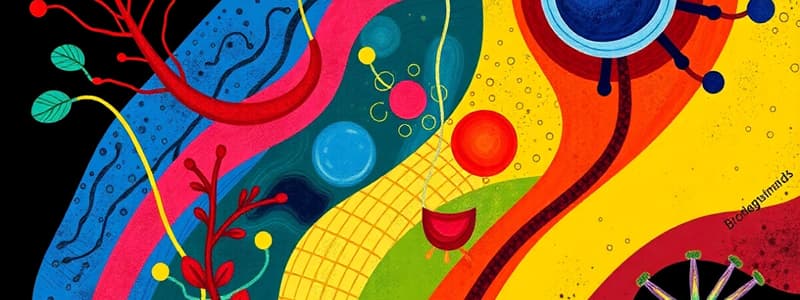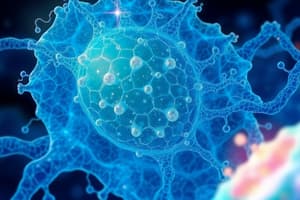Podcast
Questions and Answers
Which element is essential for the formation of proteins and acids?
Which element is essential for the formation of proteins and acids?
- Nitrogen (correct)
- Carbon
- Phosphorus
- Sulfur
What is the primary energy currency of cells?
What is the primary energy currency of cells?
- ATP (correct)
- ADP
- Glucose
- NADH
Which organelle is responsible for producing energy through cellular respiration?
Which organelle is responsible for producing energy through cellular respiration?
- Nucleus
- Ribosome
- Chloroplast
- Mitochondria (correct)
What process takes place in chloroplasts?
What process takes place in chloroplasts?
Which of the following elements plays a crucial role in the structure of organic molecules?
Which of the following elements plays a crucial role in the structure of organic molecules?
What is the basic unit of life?
What is the basic unit of life?
Which branch of biology focuses on the study of microorganisms?
Which branch of biology focuses on the study of microorganisms?
What process allows plants to convert light energy into chemical energy?
What process allows plants to convert light energy into chemical energy?
Which of the following is NOT a characteristic of living things?
Which of the following is NOT a characteristic of living things?
What is the process by which cells break down food to release energy?
What is the process by which cells break down food to release energy?
Which level of biological organization comes after tissues?
Which level of biological organization comes after tissues?
What does evolution refer to in biology?
What does evolution refer to in biology?
Which concept refers to the ability of organisms to maintain a stable internal environment?
Which concept refers to the ability of organisms to maintain a stable internal environment?
Flashcards
Cell Division
Cell Division
The process by which cells reproduce, including mitosis and meiosis.
Nutrient Cycling
Nutrient Cycling
The continuous movement and transformation of nutrients within an ecosystem.
Natural Selection
Natural Selection
The driving force behind evolution, favoring traits that increase survival.
DNA
DNA
Signup and view all the flashcards
ATP
ATP
Signup and view all the flashcards
Biology
Biology
Signup and view all the flashcards
Cell
Cell
Signup and view all the flashcards
Photosynthesis
Photosynthesis
Signup and view all the flashcards
Metabolism
Metabolism
Signup and view all the flashcards
Ecosystem
Ecosystem
Signup and view all the flashcards
Evolution
Evolution
Signup and view all the flashcards
DNA Replication
DNA Replication
Signup and view all the flashcards
Homeostasis
Homeostasis
Signup and view all the flashcards
Study Notes
Introduction to Biology
- Biology is the scientific study of life and living organisms.
- It encompasses a vast range of topics, including the structure, function, growth, evolution, distribution, and taxonomy of living things.
Branches of Biology
- Zoology: The study of animals.
- Botany: The study of plants.
- Microbiology: The study of microorganisms, including bacteria, viruses, fungi, and protists.
- Ecology: The study of interactions between organisms and their environment.
- Genetics: The study of heredity and variation in organisms.
- Molecular Biology: The study of biological processes at the molecular level, including the structure and function of DNA, RNA, and proteins.
- Physiology: The study of the functions of living organisms and their parts.
- Cell Biology: The study of the structure and function of cells.
Key Concepts in Biology
- Cells: The basic unit of life.
- Energy: Essential for all life processes.
- Growth and development: Characteristic of living things.
- Reproduction: Allows for the continuation of species.
- Adaptation: Enables organisms to survive in their environment.
- Evolution: The process of change in organisms over time.
- Homeostasis: The ability of organisms to maintain a stable internal environment.
- Interdependence: The relationship between organisms and their environment.
Levels of Biological Organization
- Atoms: Building blocks of matter.
- Molecules: Combinations of atoms.
- Macromolecules: Large molecules such as proteins, carbohydrates, and lipids.
- Cells: Basic units of life.
- Tissues: Groups of cells with similar structure and function.
- Organs: Groups of tissues with specific functions.
- Organ Systems: Groups of organs that work together.
- Organisms: Individual living things.
- Populations: Groups of individuals of the same species in a given area.
- Communities: Interacting populations in a specific area.
- Ecosystems: Communities and their physical environment.
- Biosphere: All living organisms and their environments on Earth.
Key Biological Processes
- Metabolism: Chemical processes that occur in cells.
- Photosynthesis: The process by which plants convert light energy into chemical energy.
- Cellular Respiration: The process by which cells break down food to release energy.
- DNA Replication: The process of copying DNA.
- Protein Synthesis: The process of making proteins.
- Cell Division: Mitosis and meiosis.
- Nutrient Cycling: The movement and transformation of nutrients in ecosystems.
- Natural Selection: Driving force of evolution.
Fundamental Elements in Biological Systems
- Carbon: Crucial for the structure of organic molecules in living things.
- Hydrogen: Another key component of organic molecules and water, which is essential for life.
- Oxygen: A vital element for respiration and many biological processes.
- Nitrogen: Necessary for the creation of proteins and nucleic acids.
- Phosphorus: Required for energy transfer, DNA, and RNA.
- Sulfur: Important in several amino acids.
Common biological structures and functions
- DNA: Deoxyribonucleic acid, the genetic material in most organisms
- RNA: Ribonucleic acid, involved in protein synthesis
- ATP: Adenosine triphosphate, the primary energy currency of cells
- Mitochondria: Responsible for cellular respiration, producing energy in the form of ATP.
- Chloroplasts: Organelles where photosynthesis takes place in plants.
Studying That Suits You
Use AI to generate personalized quizzes and flashcards to suit your learning preferences.




